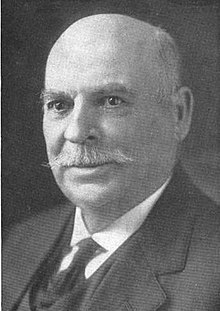Alfred A. Taylor
Alfred Alexander Taylor (born August 6, 1848 in Carter County , Tennessee , † November 25, 1931 in Johnson City , Tennessee) was an American politician and the 38th governor of Tennessee. He also represented this state in the US House of Representatives .
Early years and political advancement
Alfred Taylor, the son of Congressman Nathaniel Green Taylor (1819–1887), attended, among other things, the Buffalo Institute , now Milligan College . He then studied law and was admitted to the bar in 1874. First he practiced as a lawyer in Jonesboro and later in Johnson City.
In contrast to his brother Robert , Alfred belonged to the Republicans . For this party he was elected to the Tennessee House of Representatives in 1874 . In 1886 his party nominated him as their candidate for the upcoming gubernatorial election. His democratic rival was his brother Robert, of all people. The election campaign that followed went down in state history as the Tennessee version of the English Wars of the Roses . In fact, supporters of both parties wore a white and a red rose, just like the two warring parties in 15th century England. The election of 1886 was won by Robert. Alfred was elected to the United States House of Representatives in 1888. In Congress he supported the so-called McKinley Tariff Act. He also supported a bill to protect the right to vote for African Americans . After the end of his third term in Congress, he started a new career with his brother as a guest speaker at various events. He also still worked as a lawyer.
Governor of Tennessee
In 1920, eight years after his brother's death, he was nominated again for governor of Tennessee. At that time, Alfred Taylor was already 72 years old. Still, it wasn't difficult for him to win the election because the Democrats were at odds over Governor Albert H. Roberts' policies . For the first time, women were able to vote in these elections in Tennessee. As governor, he campaigned for a reform of the controversial tax law and expanded the powers of the state railway committee. Further reforms were blocked by parliament. Noteworthy is his successful work in converting a nitrate factory built for the First World War on the Tennessee River into an electric power plant. The factory was just outside of Tennessee's borders in Muscle Shoals , Alabama ; The energy generated benefited the entire region. This project is considered to be the forerunner of the TVA project under President Franklin D. Roosevelt over ten years later.
Old age and death
In 1922 Alfred Taylor was defeated by the Democratic candidate Austin Peay . He remained the last Republican governor of Tennessee until 1971. He also holds the Tennessee governor age record to this day. After the end of his only tenure, he retired to Johnson City, where he died in 1931. He was married to Jennie Anderson, with whom he had ten children.
Web links
- Alfred A. Taylor in the Biographical Directory of the United States Congress (English)
- Alfred A. Taylor in the database of Find a Grave (English)
- Alfred Taylor in the National Governors Association (English)
- The governors of Tennessee (English)
| personal data | |
|---|---|
| SURNAME | Taylor, Alfred A. |
| ALTERNATIVE NAMES | Taylor, Alfred Alexander (full name) |
| BRIEF DESCRIPTION | American politician and the 38th Governor of Tennessee |
| DATE OF BIRTH | August 6, 1848 |
| PLACE OF BIRTH | Carter County , Tennessee |
| DATE OF DEATH | November 25, 1931 |
| Place of death | Johnson City , Tennessee |


